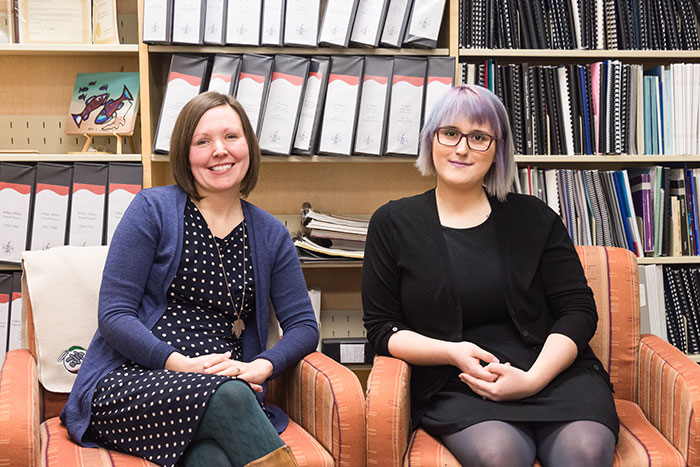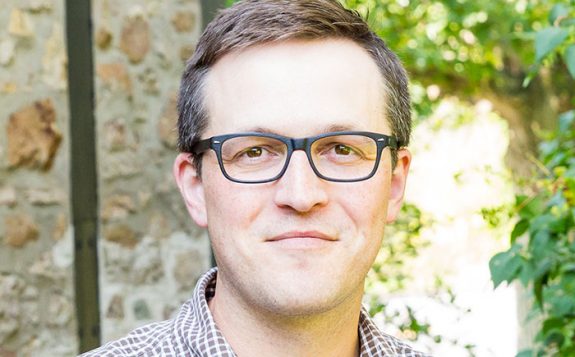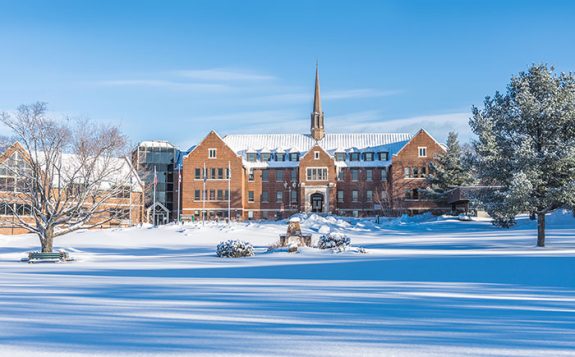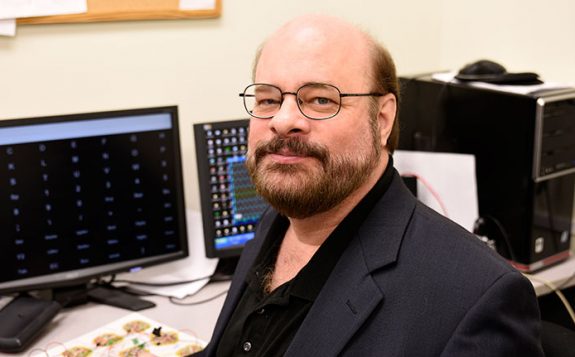The Shingwauk Residential Schools Centre (SRSC), housed in the East Wing of Algoma University’s campus, is an invaluable research resource for residential school Survivors, students, academics, and community members. Third-year student Skylee-Storm Hogan has worked in the SRSC for almost two years, and it has provided her with notable opportunities to get involved in public history, archival studies, and even more impressively, to be published on a prominent Canadian history blog.
Hogan is Kanien’kehá:ka and is in her third year of studies, majoring in Law and Justice with a minor in Political Science. She has been working closely alongside Researcher/Curator Krista McCracken in the SRSC through her work-term placement. Hogan is responsible for assisting with digital and physical processing, event coordination, photography, and modifying digital and physical records. She also assists with residential school tours and meeting with visitors who frequent the centre. Her duties range in spectrum from museum studies to archival studies.
McCracken, who has been working with the SRSC since 2010, is responsible for the day-to-day archival administration and outreach programming. She creates educational programming for students from Grade Three through to post-secondary, organizes workshops, facilitates talks with Survivors, promotes access to the SRSC’s archival collections, among others.
Together, they share the significant responsibility of teaching university and community members about the implications and repercussions of the residential schools era. There has been a greater interest in understanding Indigenous history, including the legacy of residential schools, thanks in part to the Truth and Reconciliation Commission (TRC) of Canada’s Calls to Action. “It’s a very big responsibility, perhaps the biggest responsibility we have here at the centre,” begins McCracken, sitting in a chair in the SRSC. “People who are interacting with Indigenous communities need to understand the history of residential schools and colonialism in Canada and the ongoing impacts of those systems in Canada. Learning the historical context is a crucial part of being able to properly interact and have a dialogue.”
McCracken notes that they have had many professional organizations frequent the centre over the past year, including those from the Government of Ontario, local legal clinics, the Northern Ontario School of Medicine, among others. Typically, these organizations seek tools and information to better understand the Indigenous communities with which they work.
Aside from her work with the SRSC, McCracken contributes to publications like Canada’s History and participates in the prominent Canadian-based website Active History, which demonstrates how historical matters of the past influence today’s current affairs. “I’m part of the Active History editorial collective that manages the site and I also write regularly for the website on topics of my choice. My posts often relate to the work I’m doing here with the centre or focus more broadly on community-based archives.” McCracken was also part of the Active History team which organized the 2015 Social Sciences and Humanities Research Council-funded “New Directions in Active History” conference at Huron College.
In December 2016, Hogan and McCracken’s work in the SRSC collided on Active History. Together, they published “Doing the Work: The Historian’s Place in Indigenization and Decolonization”.
“The article was looking at what historians can do to follow the TRC’s recommendations, decolonize their research, and how they frame history,” says Hogan.
The article was inspired by Dr. Shuaneen Pete of the University of Regina. “Part of that came from when Dr. Pete was here on campus and talked about indigenizing the academy and decolonizing the academy… People are throwing these words around a lot and there is often some misunderstanding as to what they actually mean. There are these great ideas, but how on an everyday level, do teachers and scholars incorporate them into the classroom?” asks McCracken.
The co-authors provide thoughtful suggestions on how to decolonize and respectfully indigenize institutions. Suggestions include creating inclusive syllabuses that feature Indigenous and community-based scholars; acknowledging the traditional land that the place of learning is located on; partnering with Indigenous peoples in research; and engaging in culture-based learning activities.
Hogan and McCracken’s post received plenty of positive feedback. Historian Andrea Eidinger featured the article on her blog, Unwritten Histories, in her “Favourite Canadian History Blog Posts of 2016” feature. Eidinger deemed the duo’s article as one of her top three favourite Canadian history blog posts of 2016. “I was really excited about that,” begins Hogan. “I was working in the mall over the holidays and I had a professor from Algoma who teaches history tell me that he liked our article and that he was excited to see it on the round up.”
The reality of being published as an undergraduate student didn’t sink in immediately for Hogan. “My roommate was so much more excited than I was. And I let that sink in for a bit and then realized, okay, this is a big deal. It was cool to be able to post a link to something that I helped write. You don’t get that opportunity too often in your undergrad.”
Hogan and McCracken do have plans to write other articles. Right now, however, Hogan is exploring a topic on her own relating to active versus passive or peaceful activism. She is interested in how effective each platform has been by looking at successful historical movements in Canada.
Upon graduation, Hogan is hoping to continue working with a community-based archive. “I like working with community members and local stories because often there are very interesting stories which have never been told. You find out more about where you live and that often changes your perspective on places.”
For more information on the SRSC, please visit www.shingwauk.org.
Share Article




